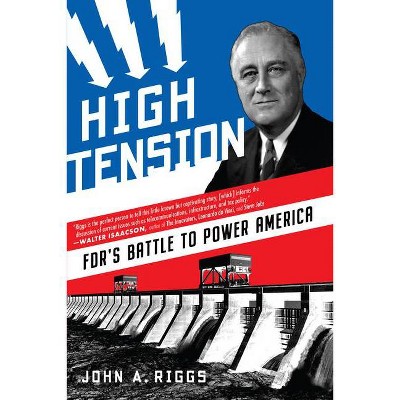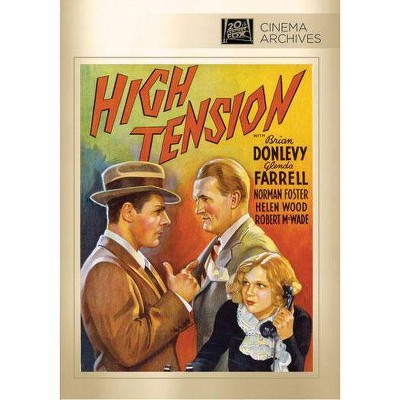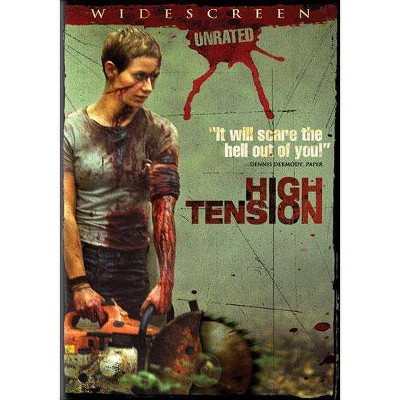High Tension - by John A Riggs (Paperback)

Similar Products
Products of same category from the store
AllProduct info
<p/><br></br><p><b> About the Book </b></p></br></br>"From the highest halls of power to the most remote corners of rural America, featuring amazing technological innovation and an epic battle between the captains of a corrupted industry and America's most politically astute president, here is the story behind the greatest peacetime achievement in US history--the electrification of an entire nation under Franklin Delano Roosevelt."--Provided by publisher.<p/><br></br><p><b> Book Synopsis </b></p></br></br><b>The story behind one of the greatest peacetime achievements in US history and a model for today's ongoing government fight with big tech―Franklin Delano Roosevelt's crusade to electrify the entire nation. <p/></b> <b>Ranging from the highest halls of power to the remote corners of rural America, it was an epic battle between powerful industry captains and America's most politically astute president.</b> <p/> When Franklin Delano Roosevelt took office in the depths of the Depression, high tension--or high voltage--power lines had been marching across the country for decades, delivering urban Americans a parade of life-transforming inventions from electric lights and radios to refrigerators and washing machines. But most rural Americans still lived in the punishing pre-electric era, unconnected to the grid, their lives consumed and bodies broken by backbreaking chores. <p/> <i>High Tension</i> is the story of Franklin Delano Roosevelt's battle against the "Power Trust," an elaborate Wall Street-controlled web of holding companies, to electrify <i>all </i> of America--even when the corrupt captains of the industry and their cronies (led by a formidable and honest champion, Wendell Willkie, whose role in the battle propelled him to a presidential bid to unseat Roosevelt in 1940) cried that running lines to rural areas would not be profitable and that in a free market there would simply have to be a divide between the electricity haves and have-nots. <p/> FDR knew better. And in this story of shrewd political maneuvering, controversial legislation, New Deal government organizations like the Tennessee Valley Authority, the packing of Federal courts, towering business figures, greedy villains, and the crying needs of farmers and other rural citizens desperate for services critical to their daily lives, John A. Riggs has chronicled democracy's greatest balancing act of government intervention with private market forces. Here is the tale of how FDR's efforts brought affordable electricity to all Americans, powered the industrial might that won World War II, and established a model for public-private solutions today in areas such as transportation infrastructure, broadband, and health care.<br><p/><br></br><p><b> Review Quotes </b></p></br></br><br>"The little known but captivating story of electricity is at the heart of the New Deal. John A. Riggs is the perfect person to tell the tale. The battles between America's most politically astute president and a powerful industry created the hybrid, public-private electricity system that we know today. The compromises necessary to ensure equity and the public interest while unleashing the energy of private markets can inform the discussion of current issues such as telecommunications, infrastructure, and tax policy."<br> <b>--Walter Isaacson, </b> author of <i>The Innovators</i>, <i>Leonardo da Vinci</i>, and <i>Steve Jobs</i> <p/> "Electricity was the internet of its day--and bringing it to the countryside affected more Americans than any other New Deal program. It was also the source of a bitter struggle between public and private power, full of 'high tension'--the double entendre title of John A. Riggs's lucid and compelling tale. This is a fresh angle of vision on one of the most important and under-appreciated stories of the first half of the 20th century."<br> <b>--Jonathan Alter</b>, author of <i>The Defining Moment: FDR's Hundred Days and the Triumph of Hope</i> <p/> [A]n exhaustive look at President Franklin Roosevelt's multipronged war against the private utility sector....Riggs dives deep into the legislative, judicial, and public opinion battles over Roosevelt's energy initiatives, including the Tennessee Valley Authority, and argues that the hybrid public-private system that emerged in America was critical to the nation's 'economic global supremacy' during and after WWII....[T]his authoritative account is a valuable resource for students of America's energy policy.<br> <b>--<i>Publishers Weekly</i></b> <p/> <i>High Tension: Franklin Roosevelt's Battle to Power America</i> is an innovative history of the chaos and conniving that created America's transformative electricity system (judged by <i>The Atlantic</i> to be the greatest invention since the printing press). Jack Riggs has given us a compelling read. Thoroughly researched and gracefully written, it crisply covers the historical panorama of the New Deal's hard-won achievements of breaking up the giant utility holding companies and bringing light and power to the vast darkened regions of our nation. A must for historians, it is also a gripping read for all." <br> <b>--Martin J. Sherwin, </b> Pulitzer Prize-winning co-author of <i>American Prometheus: The Triumph and Tragedy of J. Robert Oppenheimer</i>, and author of <i>A World Destroyed: Hiroshima and Its Legacies</i> <p/> "<i>High Tension</i> vividly tells of FDR's struggle to control giant utility holding companies, build government dams, and electrify rural America. He took on powerful interests and reshaped the electricity system as a novel public-private enterprise--a legacy that continues to this day. John A. Riggs tells an important story with relevance today, from reinventing electricity regulation to accommodate new clean energy technology to offering lessons for universal broadband access."<br> <b>--Ernest J. Moniz</b>, U.S. Secretary of Energy, 2013-2017, CEO Energy Futures Initiative <p/> "Narrative history at its best. Riggs brings FDR to life as he gathers a team of brilliant and eccentric New Dealers to battle for public power, rural electrification, and the abolition of holding companies. The industry fights back with a coalition of stock manipulators and free enterprise proponents led by a remarkable advocate named Wendell Willkie."<br> <b>--Bruce Babbitt</b>, U.S. Secretary of the Interior, 1992-2000 <p/> "The story of electrification is the story we must return to, over and over again, to understand what it really means to build a public utility. Our age, like every age, has its essential services, and as John A. Riggs demonstrates, getting it right does not happen by accident, nor without a fight, but demands great political courage."<br> <b>--Tim Wu</b>, Professor, Columbia Law School; <i>New York Times</i> contributing opinion writer; and author of <i>The Curse of Bigness: Antitrust in the New Gilded Age</i> <p/> "Electric utilities are fascinating combinations of economics, technology, and politics. Somehow all three have to be kept in harness for utility companies to succeed. Mr. Riggs explores the interplay of these factors in one of the most complex periods in the history of the industry. Good reading for anyone who likes the lights to come on and the computer to work."<br> <b>--John Rowe</b>, former CEO of Commonwealth Edison and Exelon <p/> "A valuable resource dealing with a largely--and undeservedly--ignored slice of FDR's New Deal agenda, but also of American history and, indeed, of all human progress."<br> <b>--David Pietrusza</b>, author of <i>1948: Harry Truman's Improbable Victory and the Year That Transformed America</i> <p/> "John A. Riggs gives us a fresh look at the people and politics that brought electricity to virtually all Americans, shaped today's economy, and powered the Arsenal of Democracy that led to victory in World War II. <i>High Tension</i> is a strong reminder of Edmund Burke's 18th Century admonition that 'politics ought to be adjusted, not to human reasoning, but to human nature, of which the reason is a part.' It is a joy to read and of enduring value."<br> <b>--Charles B. Curtis</b>, Chairman, Federal Energy Regulatory Commission 1977-1981 <p/> "The United States electric system not only underpins our economy, but also our way of life. Yet most Americans know nothing about its history. This story of a critical era in the development of the US power sector is a riveting tale of inventors, entrepreneurs, politics, legal battles, and shenanigans. The reader will come away with a new appreciation for what we take for granted."<br> <b>--Elizabeth Moler</b>, Federal Energy Regulatory Commissioner, 1988-1997, Chair, 1993-1997; and Deputy US Energy Secretary 1997-1998, Acting Secretary, 1998 <p/> In an engaging narrative, <i>High Tension</i> captures a transformative time in American history with titanic characters, exploring some of the most compelling battles of the early 20th Century with scintillating detail. It's also a book with powerful relevance today, reminding us that the conflict between corporate concentration of power and public interests is ongoing, unresolved, and demands our attention if we hope to achieve social progress in this century.<br> <b>--John F. Wasik</b>, author of <i>The Merchant of Power: Thomas Edison, Samuel Insull and the Creation of the Modern Metropolis</i> <p/> The book features winning vignettes. . . . The meat of the saga, however, is the decades-long struggle to end the financial legerdemain that infested the electricity business, which constructed pyramid schemes with up to 10 levels of holding companies owning holding companies, all designed to divert profits to top financiers while placing the least amount of capital at risk. . . . Presenting a story that mingles business and politics at the highest level, <i>High Tension</i> has a complex tale to tell, one that requires the reader's attention. <p/> <b><i>----Washington Independent Review of Books</i></b> <p/><br>
Price History
Cheapest price in the interval: 17.39 on October 22, 2021
Most expensive price in the interval: 17.39 on December 20, 2021
Price Archive shows prices from various stores, lets you see history and find the cheapest. There is no actual sale on the website. For all support, inquiry and suggestion messagescommunication@pricearchive.us




















